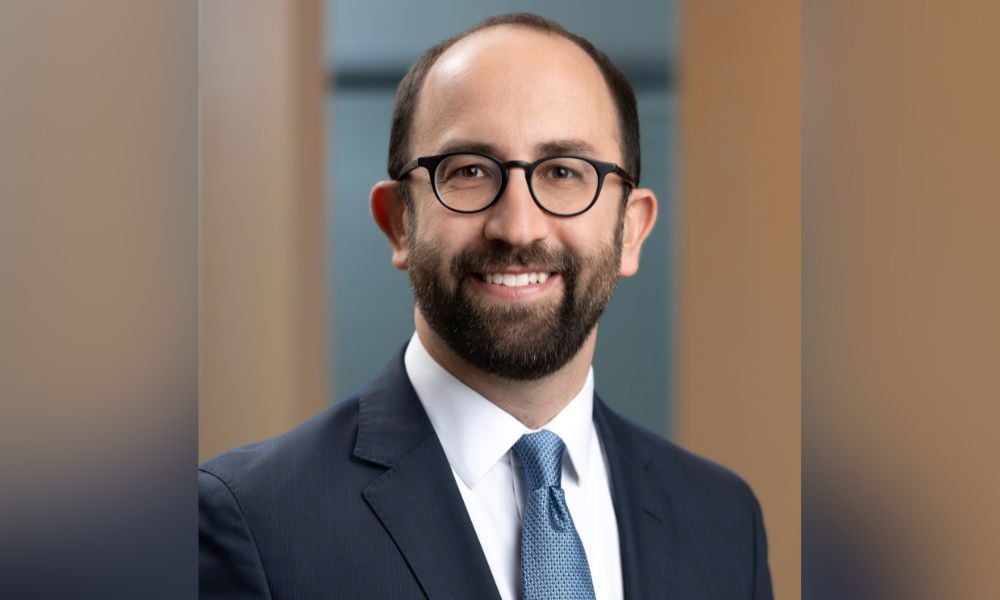
A partner at Goldblatt Partners LLP, Century has a high-profile – and high-impact – track record

In February, migrant agricultural workers filed a proposed class action against the government of Canada. Employed under temporary work programs meant to bolster the agriculture sector’s workforce, the plaintiffs alleged the programs violated their rights under the Charter of Rights and Freedoms – requiring them to pay employment insurance premiums while denying them access to EI benefits.
The case is representative of Louis Century’s career thus far. As a partner in the civil litigation group at Goldblatt Partners LLP and one of the lawyers representing the migrant workers, he has spent more than a decade litigating employment and human rights issues on workers and other individuals. The case concerns the rights of migrants, an issue Century has been passionate about since he was a law student at the University of Toronto’s Faculty of Law. The case is also a class action, a tool that Century has used for years to seek accountability from employers and state actors.
“Class actions are only a part of my practice, but it is very exciting on the plaintiff’s side to be able to consider the possibility of a class action as a way to not only vindicate an individual's rights but also to drive for systemic change and achieve compensation or remedies for a larger group of people,” Century says.
Century’s work often yields favourable – and high-profile – results. Last year, CIBC agreed to pay $153 million to employees who claimed in a class action the bank owed them unpaid overtime wages. Roy O’Connor LLP and Goldblatt Partners filed the lawsuit before Century joined the latter firm, but the litigation stretched on for so long that Century spent the first decade of his career working on the case.
In 2021, the Ontario Divisional Court struck down the Doug Ford government’s “Student Choice Initiative,” which made certain non-tuition fees – including those collected by student unions – optional. Century was part of a team that filed the judicial review on behalf of the Canadian Federation of Students and the York Federation of Students, arguing that the government lacked the authority to enact the policy. The Ontario Court of Appeal upheld the ruling later the same year.
“That was an incredibly exhilarating case, and it was such an honour to represent so many student leaders who came forward to challenge this policy,” Century says. “In the years that have passed since, many student leaders who were around at that time and fought against the so-called Student Choice Initiative have stories to tell about that struggle.
“To be able to be a lawyer playing a role in opposing that kind of a policy was a huge honour,” he adds.
Like many lawyers, Century was drawn to the profession to pursue social justice. He grew up in Banff, Alberta, and Montreal and applied to law school in Toronto not necessarily because he wanted to be a lawyer but because he was attracted “to some vague notion that I could employ that legal education to work on causes that were important to me.”
Century decided he wanted to be a refugee lawyer as a student at the University of Toronto’s Faculty of Law. He interned with the United Nations High Commissioner for Refugees, the International Criminal Court, the Downtown Legal Services clinic at UofT, and the Canadian Council for Refugees.
When he graduated and was clerking for the Supreme Court of Canada, however, Goldblatt Partners’ reputation as a progressive litigation firm compelled him to apply, even though the firm mainly focused on labour and employment matters at the time. The firm had “a general value system that resonated with me,” Century recalls.
After joining the firm, Century continued volunteering with organizations focused on refugee issues even as he honed his labour and employment practice. But over the past few years, “my career has come full circle in some sense because I have started partnering with refugee lawyers taking on civil claims against the Canadian government relating to state misconduct.
“I'm not a refugee lawyer in that I don't practise immigration and refugee law,” he says. “But I increasingly do civil cases that raise issues relating to immigration and refugee law.” In April, one of those cases – a lawsuit alleging that the Canadian Border Services Agency deliberately withheld information that could have prevented a Jamaican man’s deportation – was featured on the front page of the Toronto Star.
It’s a direction Century wants to keep pursuing, he says.
“I have always been passionate about the rights of refugees and migrants,” he says. “Oftentimes there are terrible wrongs that are committed in the immigration and refugee law sphere, and the lawyers who are defending these people… are on the front lines of getting their clients out of jail or preventing their unjust deportations,” he says. “But rarely is there consideration at the end of the day for accountability for the wrongs that have been committed. And what I mean by that is civil claims.
“This is an area that I've been really fortunate to practise in, partnering with some excellent immigration lawyers in bringing forward these cases as state accountability claims,” he adds. “And it's an area that I think has potential to continue to grow.”
Editor's Note: This story has been updated to correct details about two of the lawsuits mentioned and Century's practice.